
Doctorate after honours
Chemistry student Lize Greyling achieved an extraordinary accomplishment by obtaining her PhD in Chemistry only three years after completing her honours degree. Her Master’s degree has been converted into a PhD, because of its superior quality. Her project is aimed at developing alternative methods that may solve current chemical processing problems in South Africa. These methods are more cost-effective, efficient and environmentally friendly.
Innovative formulation science students impress
From solid shampoo bars to instant stain removers. These were part of the BSc Formulation Science honours students’ product showcase presented last week.
From solid shampoo bars to instant stain removers. These were part of the BSc Formulation Science honours students’ product showcase presented last week.
The students presented their innovative consumer products for final assessment, offering the viewer an opportunity to interact with the products and ask questions about them.
The theme of this year’s projects centered on the use of marula and moringa seeds and oil, which were used in seven of the 11 products.
The degree in BSc (Honours) Formulation Science was developed to provide the consumer products industries in South Africa with skilled formulators who understand and can apply the theoretical principles of blending various raw materials and active ingredients in different phases to produce stable, homogeneous, and useable consumer products, as well as to develop entrepreneurial skills for the establishment of SMEs.
Formulation Science is concerned with the knowledge and practice of blending and mixing of various components (chemical compounds) in a way that they do not react, but interact to provide a final product with very specific desirable properties or functions.
Below are the honours students and the products that they developed.
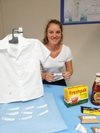
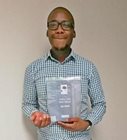
Avukonke Jona developed a fish feed for African Catfish formulated using marula seed cake (a waste product from marula oil extraction) as a protein source.
Luzaan Potgieter’s formulation was an instant stain remover pen to remove food-based stains from clothing.
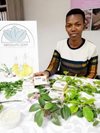
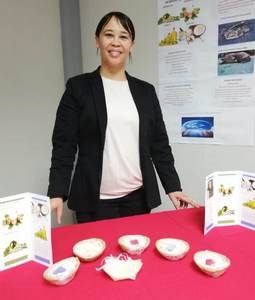
Sivuyisiwe Gora developed an exfoliating soap bar formulated with moringa oil and moringa seed powder (a waste product from moringa oil extraction).
A natural shampoo bar formulated with natural oils including moringa oil was the brainchild of Avril Jaftha. This eliminates the need for environmentally unfriendly plastic containers.
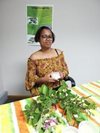

Phila Henge developed a moringa oil hair food formulation.
An exfoliating clay facial mask with marula stone powder was formulated by Abulile Dilima.
Bryce Koeberg did something a little different and formulated a silvering solution for coating plastics to produce a highly reflective surface.
Believia Makhubela developed a body massage cream with moringa oil.

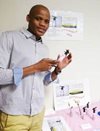
Nomahlubi Stamper’s formulation was an exfoliating foot scrub with crushed marula stone.
Another instant stain remover spray but to remove non-food stains from clothing was developed by Xolisa Hlebo.
Lyle Rockman developed a multipurpose hard surface
ant-repellent antibacterial cleaner using coffee extract and essential oils as actives.
Byron's design wins public choice award
Mechanical Engineering BTech student, Byron Blakey-Milner's optimised titanium mountain bike frame which made the top 38 entries in the world in the 2019 Permundus Challenge, won the Public Choice Award.
The Permundus Challenge is the biggest Additive Manufacturing show on the planet and Byron competed against professional and commercial entities for the award - very few of the 38 finalists were students or hobbyists.
The competition formed part of the 2019 FormNext Conference in Frankfurt, Germany.
 Byron is part of the Advanced Engineering Design Group in the Department of Mechanical Engineering at Mandela University which specialises in Design for Lightweighting and Additive Manufacturing collaborative projects. His design has already met with much favourable comment globally and was printed by EOS for display at FormNext.
Byron is part of the Advanced Engineering Design Group in the Department of Mechanical Engineering at Mandela University which specialises in Design for Lightweighting and Additive Manufacturing collaborative projects. His design has already met with much favourable comment globally and was printed by EOS for display at FormNext.
The mountain bike frame 3D-printed seamlessly in two parts consisting of the swing-arm and the main frame. This frame is designed to be printed on the Aeroswift SLM machine in South Africa in Ti-6Al-4V utilizing their extremely large bed size (2mx0.6mx0.7m).
Due to the extremely high cost of top of the range mountain biking components, this design could possibly compete with the high-end carbon fiber designs economically. Furthermore tools such as Topology Optimization as used in this project increase it's weight/stiffness competitiveness as 3D-Printers are not limited to single/split draw mold constraints like carbon bikes are.
This will be the first time a SLM bicycle has been printed without welding sections together and will be one of the largest metal 3D-Printed objects ever.
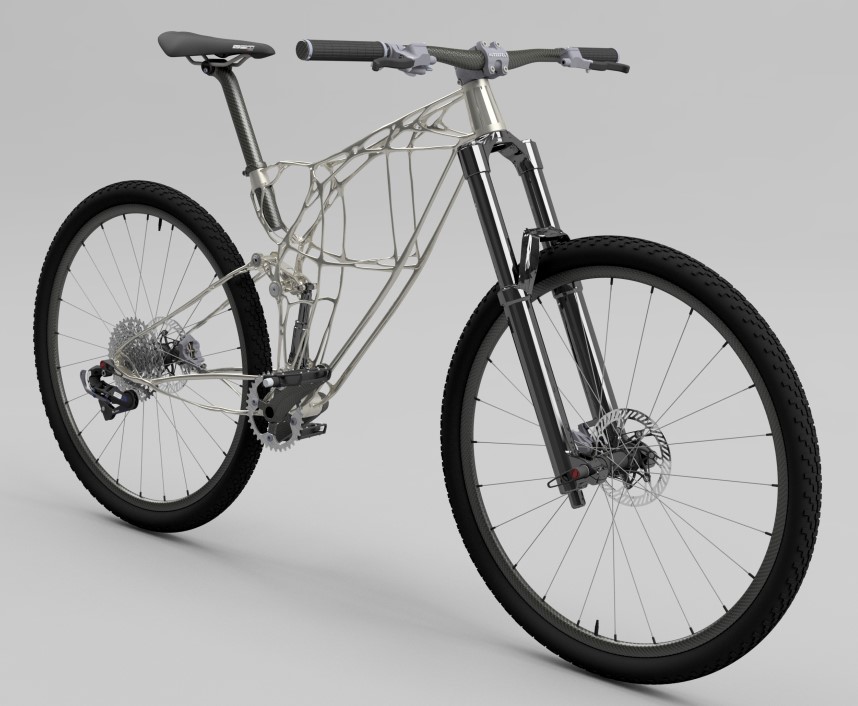
International conference award for Mandela Uni computer scientists
(Left to right) Prof Kelvin Bwalya - Deputy-Dean: Research and Internationalisation College of Business & Economics); University of Johannesburg, Dr George Anderson - Department of Computer Science; University of Botswana, Ms Stella Bvuma - Head of Department: Applied Information Systems; College of Business and Economics; University of Johannesburg, Prof Brenda Scholtz - Associate Professor & HOD Computing Sciences; Nelson Mandela University and Faith Moyo - Master's student; Nelson Mandela University.
The conference, co-hosted by the University of Johannesburg and the University of Botswana, was held recently in Johannesburg and brings together national and international researchers and practitioners. This year’s theme considered how information and cyber security has been shaped by emerging new trends in the fourth industrial revolution (4IR) in the context of African businesses.
The paper, authored by Faith Moyo, Brenda Scholtz and co-supervisor Mohammed Alhassen, was titled "A Data-Driven Decision-Making Model for the Third-Party Logistics (3PL) Industry". Their research provides a model for assisting managers with decision-making in the information economy and 4IR. It specifically addresses the challenges faced by the 3PL and supply chain industry.